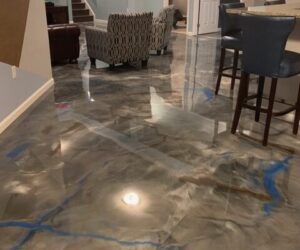If you have concrete on your property that is starting to show its age, it may be time to look for concrete resurfacing “near me.” Concrete resurfacing is the process of repairing and restoring your concrete to like-new condition. This can be done in several ways, depending on the severity of the damage and the desired outcome of your finished floors, patio, or driveway. In this article, we will discuss what concrete resurfacing is, how long it lasts, and some of the benefits you can expect from repairing and resurfacing your concrete.
 What Is Concrete Resurfacing?
What Is Concrete Resurfacing?
If you’ve already paid for a professional concrete contractor to come lay residential or commercial floors, patios, driveways, warehousing spaces, or walkways for your property, you know that while concrete is one of the most durable construction materials to work with, it is not impervious to damage. Over time, changes like cracking from rapid freezing and thawing, foundation settling, or even basic chipping can amount to a rather worn-looking concrete floor. However, this does not necessarily mean that you have to go through the expense and effort of demolishing the existing floor and start over—it is possible to resurface existing concrete floors for a fraction of the cost of replacing them.
However, it is important to note that simply resurfacing your concrete with a cementitious blend of fine sand, polymer adapters, adhesion additives, and Portland cement will not be quite as durable as true cement, and it is designed to be applied in thin coats less than ½ inch thick. Applying a concrete resurfacing mixture over your entire floor is an alternative to spot-repairing cracks, chips, or other imperfections, and tends to leave a more uniform finished surface.
Why Repair Concrete Cracks?
Aside from the inherent eyesore of a sizeable crack spiderwebbing its way across the surface of your concrete floor, there is more incentive to patch this crack other than for aesthetic purposes. Whether your cracked floor is “active” (in that it changes in size or direction over time) or “dormant,” (in which case it doesn’t change), cracked concrete floors can provide a point of moisture entry, which can lead to worse, more expensive problems down the line. For more on the many different concrete cracks, why they occur, and whether they pose safety risks, check out this source from the U.S. General Services Administration.
Which Concrete Resurfacer Is Best?
There are many different types of concrete resurfacers on the market, and each is designed with different functions in mind. For example, if you intend to completely cover a concrete slab, you will want to make sure the resurfacer you purchase will have good adhesion with that material. Some substrates can be used as floor levelers or as a preparatory surface for laying flooring materials like plywood subfloors—so make sure your resurfacer is labeled as such and is not marketed as a “floor leveler.” If you are not completely certain about which type of resurfacer is best for your floors, consider hiring a professional concrete contractor with experience working with a wide array of concrete substrates.
Does Concrete Resurfacing Last?
Many different materials can be used to resurface concrete, ranging from epoxy and polyaspartic concrete (which can last up to 20 years) or urethane and epoxy coatings, which typically don’t last more than 10. However, if the right resurfacing material is applied and it is properly maintained, concrete resurfacing can last anywhere from 10-20 years—and generally lasts longer for indoor surfaces rather than driveways or patios.
Does Concrete Resurfacing Work?
Concrete resurfacing can be a great solution for homeowners who are not interested in the expense of demolishing and redoing their concrete surfaces—and what’s more, if done properly, it can last for many years. Concrete resurfacing can not only correct imperfections like cracks or chips, but it can extend the lifespan of your floor while making it look brand new. Because it chemically bonds with the surface it is applied to (which is why, again, you need to be sure you buy the proper resurfacer), it becomes a dependable and viable solution to protecting concrete surfaces—whether they are damaged or not!
Is Resurfacing Concrete Worth It?
Considering that concrete resurfacing can cost as little as $3 per square foot and can last as much as 20 years, many homeowners find this endeavor to be a worthy investment. Of course, the cost of concrete resurfacing can also cost over $20 per square foot, depending on several factors, such as the square footage, the state of your existing concrete surface, and any desired aesthetic touches you may choose to add, such as dyeing, staining, etching, or something else. As you might have guessed, the more elaborately decorated you wish your resurfaced concrete to be, the higher the price will be. However, if you look for a trustworthy concrete contractor like The Concrete, etc., we will work with you to get an agreeable aesthetic within the constraints of your budget.
Concrete Resurfacing Near Me
If you’re looking for concrete resurfacing “near me” or reliable concrete contractors on the East Coast, you’re likely interested in taking some measures to protect your property value. As a home or business owner, it is important to maintain the value of your house or business—not only as a means of protecting your investment but as a way of potentially collecting financial returns on the property should you ever decide to sell. Resurfacing your concrete can be a faster, cost-effective way of improving the state of your concrete floors—without the hassle of demolishing and repouring them.
Interested in the best concrete surfacing “near me?” Contact the professionals at The Concrete, Etc. today for a no-obligation quote!


 What Is Concrete Resurfacing?
What Is Concrete Resurfacing?